/sub-categories/events
Events
National seminar on decentralized governance in water and sanitation in rural India, National Institute of Adminstrative Research, June 26-28, 2012, Mussorie
Posted on 07 Feb, 2012 12:13 PMOrganizer: National Institute of Administrative Research (NIAR), Mussoorie
Ministry of Drinking Water and Sanitation, Govt. of India
Venue: Lal Bahadur Shastri National Academy of Administration, Mussoorie
![]()
Description:
The National Institute of Administrative Research, Lal Bahadur Shastri National Academy of Administration, Mussoorie in collaboration with the Ministry of Drinking Water and Sanitation, Govt. of India is organizing a three days National Seminar on Decentralized Governance in Water and Sanitation in Rural India from June 26-28, 2012 at Mussoorie. The National Seminar is dedicated to academic discourse and practitioner engagement on Governance issues in the Water and Sanitation Sector. The papers received will be presented and documented in the form of a book after a peer review.
Three days training course on lake conservation at NIH Roorkee, March 14-16, 2012
Posted on 02 Feb, 2012 01:48 PMOrganizer: National Institute of Hydrology (NIH)
Venue: National Institute of Hydrology, Roorkee
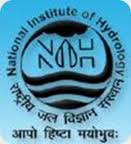
Description:
The increasing demand for fresh water due to ever growing population, calls for proper conservation and management of all the available fresh water resources, including lakes. Lakes need special attention as they are quite often the catalysts in the development of the region by supplying water for variety of uses such as drinking and civil water supply, industrial supply, irrigation, aqua-culture, recreation and tourism etc.
Training on 'Organic and Natural farming', SARRA, SAMBHAV & XIMB, Feb.7-11, 2012, Bhubaneswar
Posted on 02 Feb, 2012 12:51 PMOrganizers: South Asia Rural Reconstruction Association (SARRA), Bangalore,
XIMB & SAMBHAV, Orissa
Venue: XIM Bhubaneswar and SAMBHAV Campus, at Rohibanka, Nayagarh District Orissa.

Description:
Almost 40% of the world’s poor are living in South Asia Region. Majority of the people depend on Agriculture.The sector is undergoing an irreparable loss through excess use of chemical fertilizer and pesticides imposed by the national governments through its green revolution technologies. It is characterized by mono-cropping, heavy use of external inputs such as chemical fertilizers, Pesticides,use of machinery and exploitation of irrigationresources, although GRT produced good results in the initial stages. Currently farmers are experiencing critical problems for continued production and productivity of crops due to Soil and water degradation. Chemically used food products have lost the place in the Global market. Our much inherited ecology and bio-diversity is at a stake and getting endangered.
"International Conference on Water Quality with Special Reference to Arsenic", February 18-20, 2012, Kolkata
Posted on 02 Feb, 2012 11:20 AMOrganizer: Public Health Engineering Department, Govt. of West Bengal,
Ministry of drinking Water and Sanitation, Govt. of India
Description:
Public Health Engineering Department, Government of West Bengal in collaboration with Ministry of Drinking water and sanitation, Government of India is organizing an “International Conference on Water Quality with Special reference to Arsenic” in Kolkata on February 18-19, 2012 followed by a field visit on February 20, 2012. The meeting is being supported by several International agencies like WHO, UNICEF, World Bank-WSP, UNU and others. We expect several renowened National, International experts & participants to be there.
North East Regional Agriculture Fair, February 10-12, 2012, Guwahati
Posted on 02 Feb, 2012 09:24 AMOrganizer: Assam Agricultural University
Venue: Assam Agricultural University, Khanapara campus, Guwahati
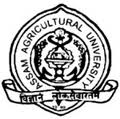
Description:
The North East Regional Agriculture Fair 2012 is being organized by the Assam Agricultural University from February 10 to February 12 at the College of Veterinary Science Play Ground, Khanapara, Guwahati on the theme ‘North East Marches towards Food Security’.
ESF invites applications for "Sustainable Sanitation and Water Management Executive Course", March 26-29, 2012, Nainital
Posted on 01 Feb, 2012 11:30 AMOrganizer: Ecosan Services Foundation (ESF),
A.T.I. (Uttarakhand Academy of Administration), Nainital
Venue: Uttarakhand Academy of Administration, Nainital
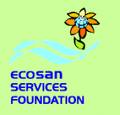

Description:
Water resources are under increasing pressure. Population growth, urbanization and a steep increase in water consumption for domestic uses, agriculture and industry has created a water crisis. Climate change is exacerbating the problems of water availability. This scenario leads to water scarcity and water-conflicts worldwide and seriously undermines progress towards achieving the Millennium Development Goals.
India Water Expo, March 1-3, 2012, Ahmedabad
Posted on 20 Jan, 2012 09:05 AMOrganizer: ASSOCHAM,
EverythingAboutWater
Venue: Gujarat University Exhibition Hall, Ahmedabad
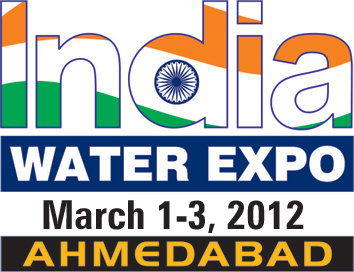
Description:
India Water Expo - the exclusive trade show on Indian Water Industry will next take place in Ahmedabad (1-3 March, 2012).The event will showcase latest offerings in water market and help bridge knowledge gaps on water & wastewater management for users industries. As a cost effective marketing platform for key players, India Water Expo ensures that you reach your target customers in India. Manufacturers specializing in water treatment, wastewater management and all other related industries can showcase and exhibit their products and expertise.
India Water Expo, April 27-29, 2012, Chennai
Posted on 20 Jan, 2012 09:02 AMOrganizer: ASSOCHAM,
EverythingAboutWater
Venue: Chennai Trade Centre, Chennai
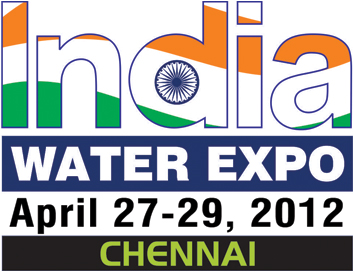
Description:
India Water Expo - the exclusive trade show on Indian Water Industry will next take place in Chennai (27-29 April, 2012). The event will showcase latest offerings in water market and help bridge knowledge gaps on water & wastewater management for users industries. As a cost effective marketing platform for key players, India Water Expo ensures that you reach your target customers in India. Manufacturers specializing in water treatment, wastewater management and all other related industries can showcase and exhibit their products and expertise.
6th World Water Forum, World Water Council, Marseille, France, March 12-17, 2012
Posted on 19 Jan, 2012 08:34 PMOrganizer: World Water Council (WWC)
Venue:
The 6th World Water Forum will be held in the "Parc Chanot - Palais des Congrès et des Expositions de Marseille". Located in the 8th District, in the centre of Marseille, a few minutes from the beaches and the Old Port, the Parc Chanot covers 170 000 sqm and comprises a convention centre and an exhibition centre.
National seminar on governance and management of drinking water, IPE, February 14-15, 2012, Hyderabad
Posted on 19 Jan, 2012 10:39 AMOrganizer: Institute of Public Enterprise (IPE)